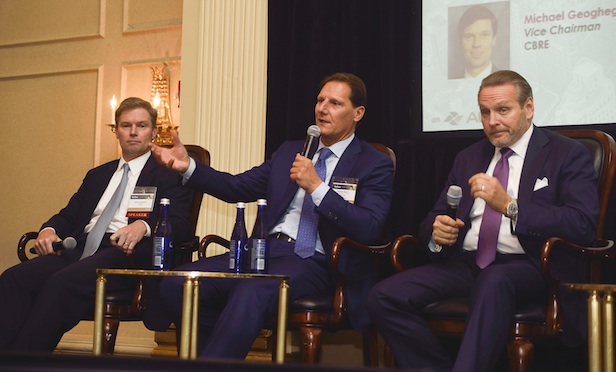 Left to right: Michael Geoghegan, CBRE; Michael Maturo, RXR, Bob Knakal, Cushman, discuss making big deals.
Left to right: Michael Geoghegan, CBRE; Michael Maturo, RXR, Bob Knakal, Cushman, discuss making big deals.
NEW YORK CITY—At first glance, the primary role of the city’s CRE brokers, developers, investors and attorneys seemingly could be boiled down to one word: transact. But in reality, the jobs of those in the industry are much more complex, calling for the evaluation of trends, building of relationships, mastery of technology, and even being soothsayers.
Professionals in all of the above categories—who often work toward each of the tasks mentioned—discussed the state of the market, and their role in it, at RealShare New York earlier this week.
“We’re in an environment of global uncertainty,” declared Arthur Mirante, principal and tri-state president, Avison Young. “That’s making it difficult for corporations to project growth.”
Meanwhile, he noted, “Slow growth has rewarded office building landlords and they are continuing to invest in their assets. Those that don’t do this will be left behind.”
In the multifamily asset class, market conditions are creating some frustration, stated Isaac Zion, co-CIO, SL Green Realty Corp. “It’s become such a pro-tenant environment that many landlords are throwing up their hands.”
Office property buyers also are finding themselves in a tough spot, he continued. “Half of the city’s office inventory belongs to institutional owners, making it tougher to get things done. That creates liquidity but when a building has individual ownership, there’s a love affair with the property.”
Still, some institutional investors have found that taking a personal approach to getting deals done works well, according to Michael Maturo, managing partner and president, RXR Realty. “We’ll build a relationship with someone around a building of interest—whether that’s a broker or ownership—and we’ll invest in terms of maybe a mezzanine position, or offering up advice on how to operate or on redevelopment. We’ll insert ourselves and build that relationship.”
Others are getting ahead by mastering technology. “Because of the volume of transactions here, there’s a tremendous amount of innovation in what brokers can do,” suggested Joe Emison, CIO, Xceligent. “There’s a huge trend in New York with additional technologies around software. Every brokerage is developing its own software as a differentiator.”
Many industry players realize that a key benefit of such tools is the data they provide. “It used to be that having data distinguished you, now it’s about what that data means,” pointed out Lindsay Ornstein, partner, Transwestern.
But for those involved in real estate services, anticipating clients’ needs is paramount. “You have to look three to four years ahead and ask yourself, ‘What could go wrong?’ And the answer is: ‘Everything,’ ” revealed Michael Geoghegan, vice chairman, CBRE. “So you need a team of people who understand what can happen and how to deal with it.”
Added Michael Werner, partner, Fried, Frank, Harris, Shriver & Jacobson, “Deals are hardly ever cookie cutter; there’s almost always something new. So you apply lessons learned from previous deals to avoid issues down the road. In order to provide solutions, you have to be creative and nimble.”





 Transwestern
Transwestern











 Copyright © 2024 ALM Global, LLC. All Rights Reserved.
Copyright © 2024 ALM Global, LLC. All Rights Reserved.